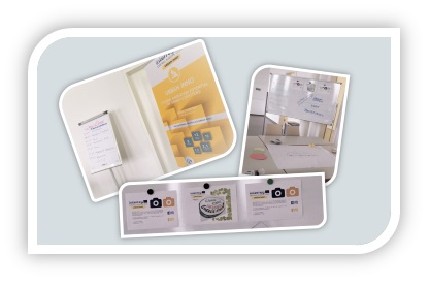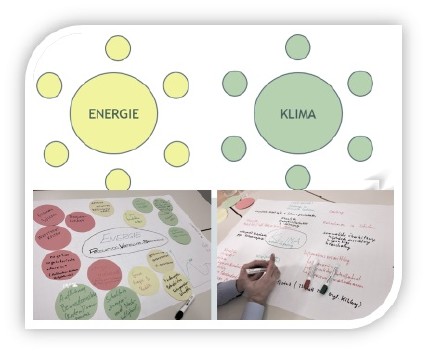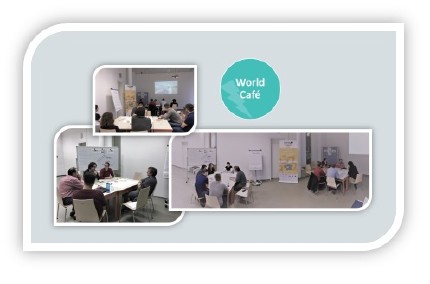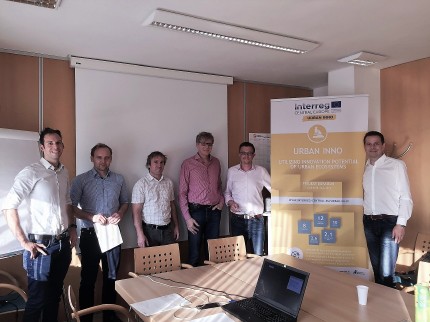PILOT BURGENLAND: Energy Strategy 2050 Neusiedl am See
Innovative participative solutions for engaging all stakeholder groups during the development of an energy strategy and a hybrid district heating system for the region Neusiedl am See
Thematic field: Energy
PILOT DESCRIPTION
In order to face climate change and reduce the CO2-emissons Burgenland pressed ahead with renewable energy, especially wind-power in the last 10-15 years. Due to the fact of new circumstances, just calling the end of subsidies of eco-electricity and the high number of hours in which power generation exceeds power demand based on weather conditions, demand-side behavior and energy efficiency measures, a huge potential for Power-to-Heat technology in district heating grids in the area of northern Burgenland was evaluated. Based on these facts and the purpose of finding an overall solution in consideration of technical, economic, legal and social aspects for the region Neusiedl, the project Hybrid DH (district heating) was initiated by Forschung Burgenland. Furthermore, the project aims to an overall concept for energy efficiency, renewable energies and in particular to a general energy strategy for 2050 for the city Neusiedl. Additionally also innovative participative solutions were needed to the primarily technical consideration. For this, we regarded to the content of the project Urban Innovation. The topic energy strategy 2050 was the ideal framework for the required pilot project within Urban Inno. While the aim of Hybrid DH is the primarily approach of technical and theoretical potential of solutions, the pilot Burgenland aimed to the greatest possible involvement of stakeholders and end-users. The in WP T2 collected participatory methods and tools were tested within the pilot project to improve the citizen and private sector inclusion in the urban innovation process of the energy strategy and the power-to-heat issue.
Forschung Burgenland considered one participatory method suitable in every main category. For the realization of the participating process, 2 methods were obligate. Nevertheless, FB implemented the following 3 methods: Living Lab, Motivational Pitch and World Café.
THE ROLE OF END-USERS IN PILOT DEVELOPMENT
Based on our three participatory methods (Living Lab, World Café and Motivational Pitch) there were three different approaches to include our stakeholders resp. the end users.
For the Living Lab a meeting with experts was organized where the experts discussed the technical approach of the integration of a hybrid district heating system also in terms of the energy strategy Neusiedl.
At the World Café private people were invited and discussed the possibilities to contribute to the implementation of the energy strategy Neusiedl within the overall sectors energy and climate.
As the motivational pitch is a video which presents the aims of the energy strategy a direct involvement of stakeholders and end users was not possible. Nevertheless the video was published via different social media channels where the stakeholders and end users could see the motivational pitch. This should influence the stakeholders and end users to contribute to the aims of the energy strategy Neusiedl.
MAIN STAKEHOLDERS INVOLVED
- Forschung Burgenland GmbH
- Municipality Neusiedl
- Energie Burgenland (energy provider)
- TBH Ingenieur (engineering & service provider)
- ECOsmart (engineering & service provider)
- Citizens
PERSPECTIVES
The impact of our pilot project is the contribution of stakeholders and end users to the energy strategy Neusiedl.
The beneficiary will be the community Neusiedl, the region itself and indirectly also the citizens and end users because when the aims of the energy strategy Neusiedl will be reached the environment in the region will be protected, costs for energy will be reduced and better living circumstances will be provided.
The energy strategy Neusiedl is a whole concept with different targets and measures. Therefore there will be a steady development of the whole concept especially concerning the topic hybrid district heating.
The project Smart city Neusiedl where the energy strategy will be implemented lasts for three years. That means in five years the project should be finished and the aims will be reached.
Within this project an innovative concept for a hybrid district heating will be developed whereas excess electricity will be used to feed the district heating. Therefore an innovative concept with innovative boilers will be developed.
PARTICIPATORY METHODS
World Café
The participatory method for the bottom-up approach for the “Energiestrategie” was the World Café. The preparation of the event location took about one hour. For the 2-hours-event a minimal agenda was set. As we are experts in the field of energy we wanted to affect the ideas of the participants as less as possible.
No strict Agenda – only clues!

Preparation of the event location
The event was opened with a short presentation of the Urban Inno team. We talked about the project, the aims of it and why participation is so important. As an icebreaker we showed the promotion video of the energy- and climate strategy – mission 2030 of Austria. This video gave some inputs and important impulses for the roundtables.
What did we worked on in detail – results?
The main topic was energy strategy (production, distribution and storage). As we decided to pursue a bottom-up approach we had to explain what this mean. We gave the participants 3 questions which should accompany them during the World Café.
- How could you personally (as an citizen) contribute to a local/regional energy and climate strategy?
- Which measures could you set?
- Which framework (laws, subsidies, support, etc.) from national/regional/local authorities do you wish for?
In the proper sense of the context we decided to go for a roundtable with the topic climate and climate change adaptation separately because it is closely linked to the energy issues.

Roundtable 1 - Energy and Roundtable 2 - Climate
The contribution of the participants was intense and the creativity process was an immediate success.
The event was closed by a short summary in storytelling format which will be the foundation of an on-shot video, which will be post in the December – compare documentation.

World Café roundtables
World Café participants
Living Lab
The Living Lab aims to provide new ideas and concepts for the hybrid district heating (power-to-heat) issue in the region of Neusiedl am See (North Burgenland) and to apply further for an implementation project. The problem and objective was already described in chapter 5.
After the invitation following stakeholder groups attended the Living Lab.
- 4wardEnergy (Research)
- Energie Burgenland (service provider)
- Enercon (Wind plant engineering company)
- Forschung Burgenland and FH Burgenland (Research and University)
During the process many ideas were developed by the experts. They needed to go deeper into the possible concepts which were already provided by the exploratory study.
The main result was that they figured out how to integrate an appropriate hybrid district heating concept into the overall context of smart city.

Living lab session
